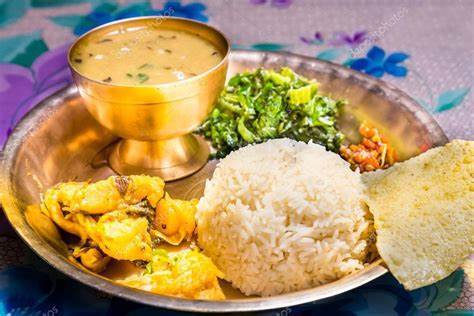Nepal, a land celebrated for its cultural and ethnic diversity, unfolds a kaleidoscope of tastes and traditions. Nowhere is this culinary mosaic more evident than in the heart of the country, Pokhara. From the indigenous Tamus to the Magars, Brahmins, and Chettris, this city encapsulates the essence of Nepal’s food diversity, offering a tantalizing journey through a myriad of local flavours.

As you traverse through the city, the aroma of local delicacies like gundruk, gedagudis, and daal cooked with local rice varieties such as pahele and jethobudo wafts through the air. The mere scent is enough to make your mouth water and your appetite soar.

Venture into the villages a few kilometres away, and you’ll encounter local raksi, a traditional alcoholic beverage crafted by the Tamu and Magar communities. Forget about the commercially branded liquors; the authenticity of local brews and the sweetness of natural spring water are unparalleled.
(P.C. www.alamy.com)
Pokhara offers a delightful array of meats—local kukhuras, kalij (jungali kukhura), turkey, and even Himalayan goat, known as chyangra. Whether in the form of succulent sukuti (dried meat) or fresh cuts, the flavours are a testament to the city’s gastronomic diversity. While you can relish pork and fish, it’s important to note that beef isn’t served in Nepal due to cultural and religious practices.


The grilled fish from Begnas and Phewa lakes emerges as a culinary jewel, adorning the city like a delicate flower. The lakeside ambience adds an extra layer of charm to the experience, making it a must-try for visitors.
But Pokhara is not just about local delights. It has become a melting pot of global cuisines. Whether you crave Italian or Mexican, Chinese or Japanese, Continental or Indian, Pokhara has a culinary offering to satisfy every palate.

Among the must-try local specialties are Thakali khana and momos—steamed or fried dumplings filled with mouthwatering ingredients. Don’t forget to discover Pokhara’s rising farm-to-table movement, forging connections between restaurants and local farmers, ensuring fresh, sustainable ingredients while boosting the local economy.
Indeed, if WordCamp Nepal aligns with the Makar Sankranti festival in January, attendees might have the unique opportunity to experience and celebrate this significant festival of harvest during their visit. The celebration opens doors to a world of kandamuls (edible roots) like sakharkhanna, tarul, khudo chiura, puffed rice laddus, and the evergreen chaku. It’s a festival where every bite tells a story of tradition and celebration.



Timing your visit during the Jatra season introduces you to the vibrant food styles of the Newar community. The famed samayabhaji takes centre stage, showcasing delightful festive delicacies that bring fresh perspectives to our diverse menu offerings.
CONCLUSION
In Pokhara, every meal becomes a cultural exploration, a journey through time and taste that leaves an indelible mark on your memories. Come, immerse yourself in the flavours of this enchanting city, where every bite tells a story, and every dish is a celebration of Nepal’s rich diversity.

